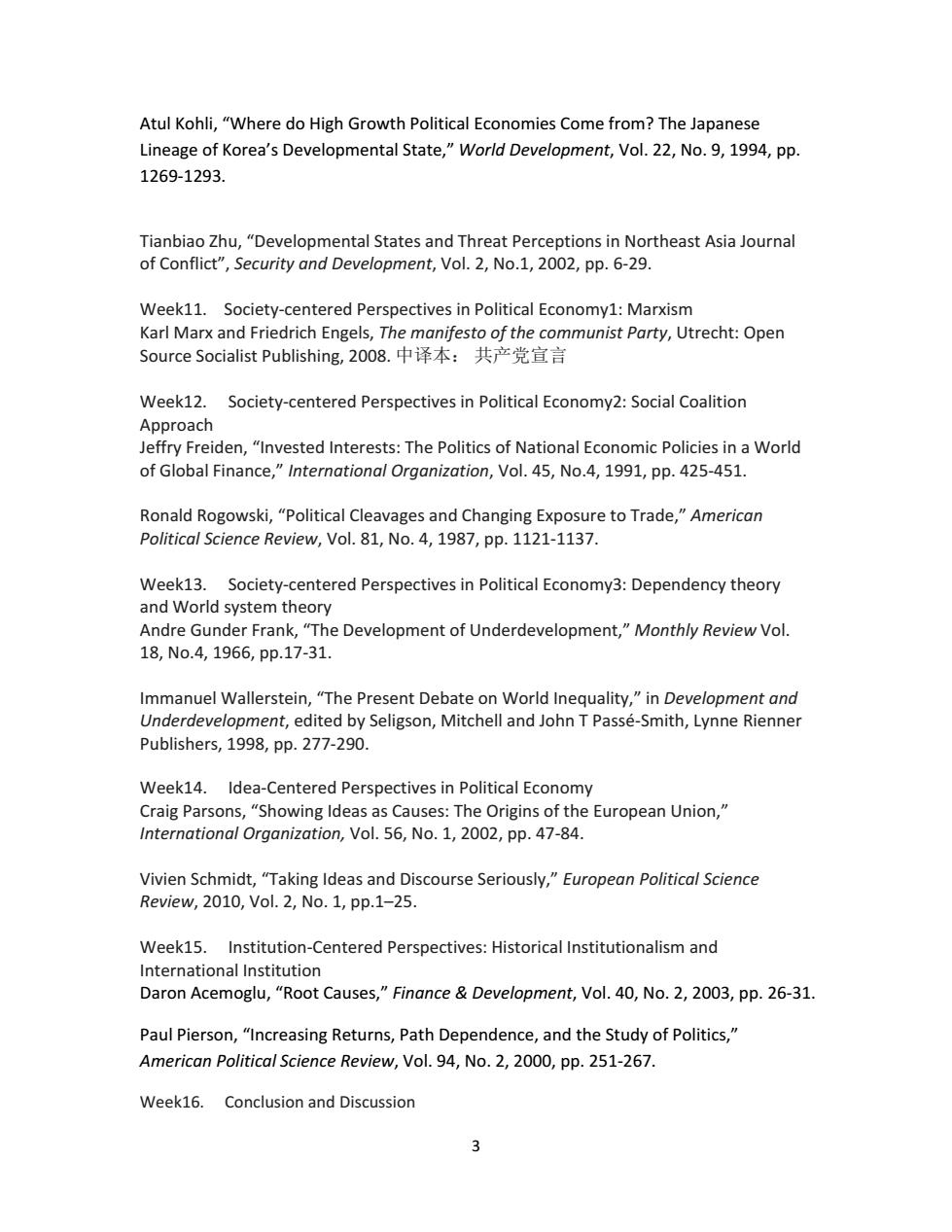正在加载图片...

Atul Kohli,"Where do High Growth Political Economies Come from?The Japanese Lineage of Korea's Developmental State,"World Development,Vol.22,No.9,1994,pp. 1269-1293. Tianbiao Zhu,"Developmental States and Threat Perceptions in Northeast Asia Journal of Conflict",Security and Development,Vol.2,No.1,2002,pp.6-29. Week11.Society-centered Perspectives in Political Economy1:Marxism Karl Marx and Friedrich Engels,The manifesto of the communist Party,Utrecht:Open Source Socialist Publishing,2008.中译本:共产党宣言 Week12.Society-centered Perspectives in Political Economy2:Social Coalition Approach Jeffry Freiden,"Invested Interests:The Politics of National Economic Policies in a World of Global Finance,"International Organization,Vol.45,No.4,1991,pp.425-451. Ronald Rogowski,"Political Cleavages and Changing Exposure to Trade,"American Political Science Review,Vol.81,No.4,1987,pp.1121-1137. Week13.Society-centered Perspectives in Political Economy3:Dependency theory and World system theory Andre Gunder Frank,"The Development of Underdevelopment,"Monthly Review Vol. 18,No.4,1966,pp.17-31. Immanuel Wallerstein,"The Present Debate on World Inequality,"in Development and Underdevelopment,edited by Seligson,Mitchell and John T Passe-Smith,Lynne Rienner Publishers,1998,pp.277-290. Week14.Idea-Centered Perspectives in Political Economy Craig Parsons,"Showing Ideas as Causes:The Origins of the European Union," International Organization,Vol.56,No.1,2002,pp.47-84. Vivien Schmidt,"Taking Ideas and Discourse Seriously,"European Political Science Review,2010,Vol.2,No.1,pp.1-25. Week15.Institution-Centered Perspectives:Historical Institutionalism and International Institution Daron Acemoglu,"Root Causes,"Finance Development,Vol.40,No.2,2003,pp.26-31. Paul Pierson,"Increasing Returns,Path Dependence,and the Study of Politics," American Political Science Review,Vol.94,No.2,2000,pp.251-267. Week16.Conclusion and Discussion3 Atul Kohli, “Where do High Growth Political Economies Come from? The Japanese Lineage of Korea’s Developmental State,” World Development, Vol. 22, No. 9, 1994, pp. 1269-1293. Tianbiao Zhu, “Developmental States and Threat Perceptions in Northeast Asia Journal of Conflict”, Security and Development, Vol. 2, No.1, 2002, pp. 6-29. Week11. Society-centered Perspectives in Political Economy1: Marxism Karl Marx and Friedrich Engels, The manifesto of the communist Party, Utrecht: Open Source Socialist Publishing, 2008. 中译本: 共产党宣言 Week12. Society-centered Perspectives in Political Economy2: Social Coalition Approach Jeffry Freiden, “Invested Interests: The Politics of National Economic Policies in a World of Global Finance,” International Organization, Vol. 45, No.4, 1991, pp. 425-451. Ronald Rogowski, “Political Cleavages and Changing Exposure to Trade,” American Political Science Review, Vol. 81, No. 4, 1987, pp. 1121-1137. Week13. Society-centered Perspectives in Political Economy3: Dependency theory and World system theory Andre Gunder Frank, “The Development of Underdevelopment,” Monthly Review Vol. 18, No.4, 1966, pp.17-31. Immanuel Wallerstein, “The Present Debate on World Inequality,” in Development and Underdevelopment, edited by Seligson, Mitchell and John T Passé-Smith, Lynne Rienner Publishers, 1998, pp. 277-290. Week14. Idea-Centered Perspectives in Political Economy Craig Parsons, “Showing Ideas as Causes: The Origins of the European Union,” International Organization, Vol. 56, No. 1, 2002, pp. 47-84. Vivien Schmidt, “Taking Ideas and Discourse Seriously,” European Political Science Review, 2010, Vol. 2, No. 1, pp.1–25. Week15. Institution-Centered Perspectives: Historical Institutionalism and International Institution Daron Acemoglu, “Root Causes,” Finance & Development, Vol. 40, No. 2, 2003, pp. 26-31. Paul Pierson, “Increasing Returns, Path Dependence, and the Study of Politics,” American Political Science Review, Vol. 94, No. 2, 2000, pp. 251-267. Week16. Conclusion and Discussion